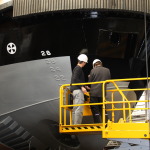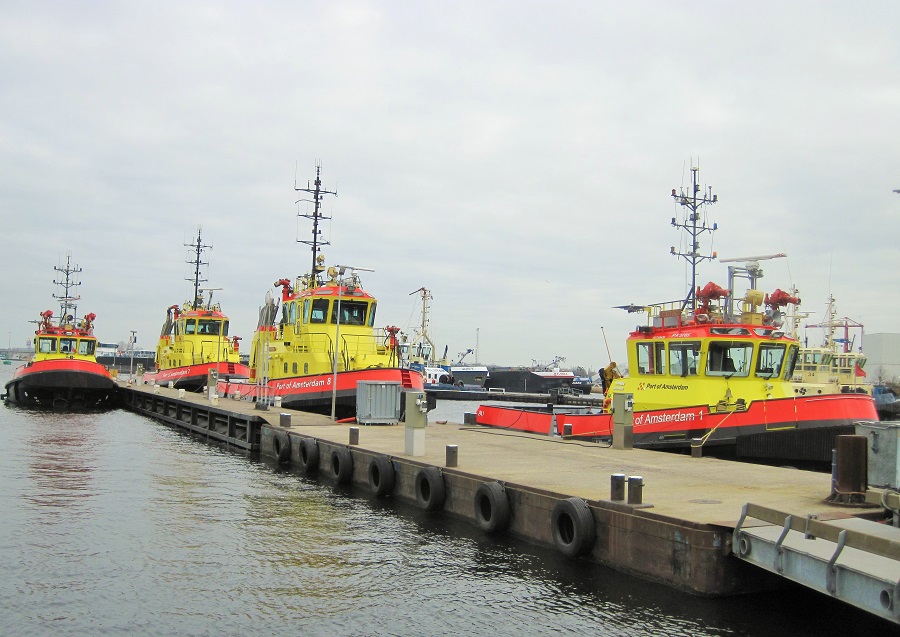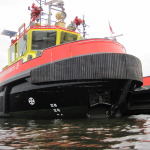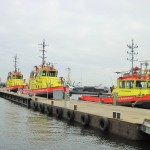 Thorn-D® antifouling outperforms conventional antifouling coatings and is environmentally friendly. A pilot project which started 1½ years ago, has proven that this new thin film coating performs better than traditional antifoulings. A real ecological and cost-efficient breakthrough for shipping companies and shipyards.
Thorn-D® antifouling outperforms conventional antifouling coatings and is environmentally friendly. A pilot project which started 1½ years ago, has proven that this new thin film coating performs better than traditional antifoulings. A real ecological and cost-efficient breakthrough for shipping companies and shipyards.
Thorn-D® pilot: economically friendly fiber versus smooth conventional coating
Dutch innovation and award-winning company, Micanti, in cooperation with Damen Shipyards launched a pilot project in the Port of Amsterdam in February 2013. (See also: “Damen introduces anti-fouling foil” for more information),
Two virtually identical sister ships were treated with different coatings. The Castor, a Damen Stan Tug 1907, was treated with a well-known conventional antifouling coating. The Pollux, also a Stan Tug 1907, was treated with the new foil, Thorn-D®. Both vessels operated at low speed in the Port of Amsterdam, under the same conditions and in the same waters.
Nylon fibers prevent marine growth on ships
“When I met Micanti’s staff for the first time, I was skeptical about using fibers to prevent marine growth. And due to Thorn-D®’s textured surface as opposed to a smooth conventional coating, I expected an increase in drag and fuel consumption,” remarks Willem Spoelstra, Manager Environment and Safety Nautical Department of the Port of Amsterdam. “But surprisingly enough, that was not the case. Thorn-D® lives up to its promise ― it prevents marine growth without increasing drag.”
Conventional antifouling coatings need movement to keep marine growth from adhering to the vessel. Thorn-D®, a fiber which acts as a physical barrier, does not require movement, and even works when a ship is moored. “We have measured the speed against its sister vessel Castor (built at Damen at the same time) on delivery. We have seen no differences at all. At present, fuel consumption is still at the level as it was at delivery. On top of this, Thorn-D® is 100% environmentally friendly, essential in reaching sustainability targets,” says Mr Spoelstra.
Non-conventional vessel coating reduces fuel consumption
Regular antifouling coatings fail earlier. The conventional coating is no longer effective once most or all of the toxins have leached into the water. Dr Rik Breur, founder of Micanti, explains: “Since Thorn-D® acts as a physical barrier against marine growth, it has a longer expected lifetime (guaranteed five years) than traditional antifouling coatings that already start degrading after 6 months.’’
More foul leads to an increase in drag and higher fuel consumption. The drag on Thorn-D has been tested at (Dutch) research institutes (TNO, Delft University of Technology and MARIN) as well as in practice on operating vessels. The general conclusion is that Thorn- D® fibers do not increase drag due to a change in the hydrodynamic flow structure.
“Not only have our pilot project and research results proven Thorn-D®’s outstanding performance, our clients from the Middle East, for example, are also positive about our new product,” adds Rik. “And these clients are constantly battling marine growth.”
Watch our short animation film (75 seconds) to see how Thorn-D® works: Animation movie Thorn-D – 75 seconds.
END OF PRESS RELEASE
For further information please contact:
Eric Pieters
Commercial Director
+31 (0)10.302.11.81
+31 (0)6.39.41.92.33
Eric.pieters@micanti.com
www.micanti.com
or
Paul Smeele
PressOffshore Public Relations
paul@pressoffshore.com
All news can be viewed on our website or sent to you on request.
About Micanti
Dutch innovation and award-winning company, Micanti, founded in 2006, develops products for effective non-toxic fouling defense technology. Micanti strives to be the market leader for non-toxic antifouling through a patented technology by applying fiber thorns as a fouling repellent.
For years, the patented product Thorn-D has been tested and continuously improved in various environments.
About Port of Amsterdam
Port of Amsterdam manages, operates and develops the port.
Port of Amsterdam ensures a safe, swift and environmentally responsible management of shipping traffic within its working area. The exploitation is aimed at port sites (rental and leasing), quays and water. In the entire Amsterdam port region a yearly amount of over 94 million tons of goods are being transhipped.
About Damen Shipyards Group
Damen Shipyards Group operates 32 ship- and repair yards, employing 9,000 people worldwide. Damen has delivered more than 5,000 vessels in more than 100 countries and delivers approximately 160 vessels annually to customers worldwide. Based on its unique, standardised ship design concept Damen is able to guarantee consistent quality.
Damen’s focus on standardisation, modular construction and keeping vessels in stock leads to short delivery times, low ‘total cost of ownership’, high resale value and reliable performance. Furthermore, Damen vessels are based on thorough R&D and proven technology.
Damen offers a wide range of products, including: tugs, workboats, naval and patrol vessels, high-speed craft, cargo vessels, dredgers, vessels for the offshore industry, ferries, pontoons and super yachts.
For nearly all vessel types Damen offers a broad range of services, such as maintenance, spare parts delivery, training and transfer of (shipbuilding) know-how. Finally, Damen offers a variety of marine components, especially nozzles, (flap-type) rudders, steering gear, anchors, anchor chains and steel works.
Damen Shiprepair & Conversion
In addition to ship design and shipbuilding, Damen Shiprepair & Conversion offers a network of 16 repair and conversion yards worldwide, with dry docks ranging up to 420 x 80 metres. Conversion projects range from adapting vessels to meet today’s requirements and regulations to the complete conversion of large offshore structures. DS&C handles 1,500 repair and maintenance jobs annually.



